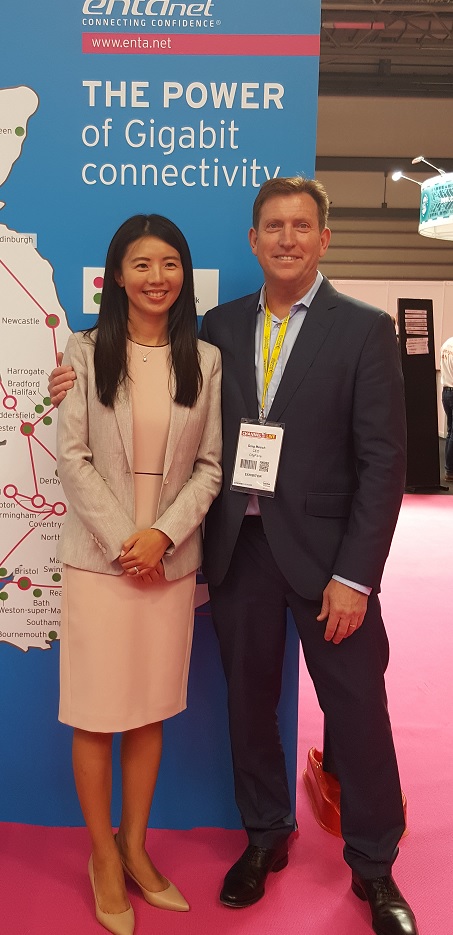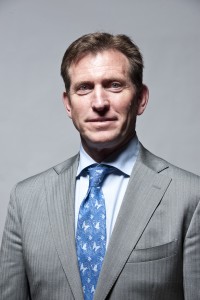
CityFibre’s most recent land grab mission saw them take over the well-established Entanet. On the day the deal concluded, David Dungay caught up with the CEO of each business, Greg Mesch, CityFibre, and Elsa Chen, Entanet, to discuss how the acquisition will add strength to Channel Partners but also further CityFibre’s mission to compete with Openreach.
Comms Business Magazine (CBM): How does the purchase of Entanet fit into your Channel strategy and overall business strategy moving forwards?
Greg Mesch (GM): Both of us see this as a merger rather than an acquisition. It’s about combining rich complementary skills and expertise and building on these to achieve CityFibre’s full fibre vision for the UK faster than would otherwise have been possible. By merging our capabilities and network assets we’re able to give Entanet’s partners more options, including differentiated products, a route to more affordable gigabit speeds and access to modern full-fibre network capability. And those same partners get to influence where we build in future too. So it’s a win-win for partners in all respects. For CityFibre, we benefit from everything Entanet’s already built, refined and has become respected for over the years. CityFibre has a good basic portal and we were already developing APIs and adding more channel managers and channel partners. But, accelerating our number of channel partners to over 1,500 and delivering the level of service that Entanet already provides at this scale would’ve taken a long time.
Elsa Chen (EC): Absolutely. When bringing on any new partner, there’s lots of engagement needed plus systems, service and product training etc. if you’re serving a handful of partners its very time consuming. But to do it at scale you need to invest heavily in the right model with the processes the systems and the people – and then refine it over time. Entanet has already been through this journey and brings all that expertise and experience with it.
CBM: What can Entanet’s current partners expect from the deal, what does it mean for them?
EC: Our partners can expect to have a truly differentiated position in the market without losing any of the products and service wrap they’ve enjoyed over the years. CityFibre’s network footprint will be brought to them with a product set that will work for them and which includes highly affordable gigabit products over a modern full fibre, capacity-rich network. That’s just day one though.
Beyond this, because we are now co-owners of physical infrastructure and have build capability as part of our extended DNA, our partners can potentially influence the build out of the UK’s alternative fibre network by demonstrating where there’s a demand-backed business case. By sharing information with us they can help us prioritise where new network investment is made and even champion better connectivity into areas where businesses are finding it especially tough to get the connectivity they need at an affordable price. We want our partners to feel empowered and enthused by what this means to their industry. In a traditional Openreach type model or with any major carrier relationship, their voice will rarely get heard. We’re changing that for them as individuals as well as a collective, and they should be as excited by it as we are.
CBM: When will the integration be complete/ products available to all parties involved?
EC: Speed to market is always key and we’re working to bring these new opportunities to the channel as soon as possible. In fact, Entanet can already provide CityFibre’s half and full gigabit Internet products to partners and we’ve already placed orders on behalf of some. The first Ethernet products will be available to partners by September in certain cities, followed by a rolling programme of availability over the next nine months.
The biggest time factor in the whole ‘readiness’ process is ordering Cablelink from Openreach to complete the last leg of the connection from the CityFibre PoP to Entanet’s PoP within the co-location space of a BT exchange. This should take 20 days but we know it can take over 6 months for these cables to be pulled from one side of a BT Exchange to the other. Once this is complete for Entanet though, our ability to resell the CityFibre product portfolio will be independent of any Openreach lead times.
CBM: What skills and technology does Entanet bring to the table to further CityFibre’s proposition?
GM: Well you know, probably more than we think. It’s often easy for young companies like ourselves to think we know everything but we’re fortunate to have a team at CityFibre who are very realistic about where our core skills lie – and it’s not managing channels. Every engagement we’ve had with Entanet and everything we’ve heard from others over the last year reinforces the fact that they really are highly-respected experts in this space. So I think it’s a huge, huge, advantage that we get.
We’re experts at building modern fibre infrastructure at scale and commercialising those into launched Gigabit Cities. We do that based on solid contracts that deliver strong yields that allow us to reinvest. Joining forces with Entanet enhances our growth vision greatly and in fact de-risks it. It means we can grow in a transformational way, capitalising on the fact that Entanet already manages thousands of channel partners that can start to consume off of our network. Entanet also has tens of thousands of broadband customers who are going to be able to upgrade to higher speed lines.
And it has thousands of Ethernet circuits too, some of which sit on our network today, so we’ll be able to support many migrations very quickly. Suddenly we get access to all the knowledge they have of working with competitive products too. Our CityFibre products then have a natural benchmark from an honest broker. This will help us make our products and our services better and better. The benefits are even greater than we thought they could be at the outset and I’m hearing that view reinforced from all our teams as they engage with one another.
CBM: How is this move going to put you ahead of the competition?
EC: The merging of CityFibre and Entanet is driven by a desire to be truly inclusive. CityFibre’s network has the power to transform the UK economy and drive the growth and the success of individual businesses, and we want to make is accessible to as many channel partners as possible, in the fastest way possible. It’s a deal that’s driven at its heart by what the UK telecoms industry needs. We see this as a highly inclusive transformation project and we’re inviting the whole channel community to be a part of it.
So it’s very simple for us. Everything our partners already love about us - i.e. the characteristics that have seen us win multiple awards for service, isn’t changing, but we are now the only channel provider player in our marketplace that has its own physical fibre infrastructure network. That’s the key new differentiator and it means the channel community, through us, now have a strong voice and a direct influence on where modern fibre network will be built. It differentiates us so much that it actually shifts our position and role in the Industry.
It goes further than this though. Among channel ‘partners’ I now include those who’ve competed against us for years. We’re keen to talk to them about how we can work together and how they too can access the benefits of CityFibre’s alternative, independent infrastructure and the incredible gigabit speed services that run over it.
GM: I agree with Elsa 100 per cent here, we want this transaction to benefit the whole industry and help drive the full-fibre Gigabit City revolution for the UK. We’re here to compete with Openreach by serving those that consume their infrastructure either directly or indirectly. Whether companies out there were Entanet’s partners or competitors in the past, there is opportunity for everyone. We’ve just created a new breed of company in the UK telecoms Industry and it’s a huge opportunity for anyone who can appreciate this.
CBM: Now the deal is complete, what can you tell us you couldn’t beforehand?
GM: Now that the deal is complete, we can talk about what would have posed as a deal breaker on each side. If Elsa had said “people aren’t most important”, or that she didn’t see any value in a third infrastructure being built across the UK, or that she was completely happy with a monopoly supplier of infrastructure, any of those would have given me huge concern. Luckily, people matter as much to her as they do to me and, like everybody else in the UK, she felt that this country needs another infrastructure to compete. CityFibre aside, the UK has one and a half infrastructures in a service based economy – neither of them full fibre. A service based economy runs on the Internet and the Internet runs at its optimum on fibre. What this country needs is a big fibre network that runs across the secondary cities, which can fuel the growth, the GDP, job creation and enterprise creation. It needs this more than anything I can think of.


